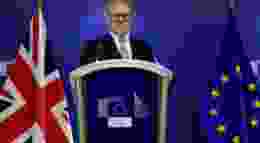
Why Trump could favour a pre-emptive strike on Russia
In a recent 'Royal United Services Institute' study RUSI, the military think tank in the UK, predicted the British Army would last about six months in a war of scale, like the one in the Ukraine. The British Army has approximately 100,000 troops. 25,000 of those are reservists. Alistair Carns said there was a need for a greater reserve stock. The Institute warned of the 'Third Nuclear Age' with Russia and China possessing huge arsenals of nuclear weapons. The Foreign Secretary, David Lammy, a diversity hire who doesn't know the difference between Armenia and Azerbaijan, said 'the time to act is now'. Grandiose words but the reality is echoed throughout Europe. The worst offender is surely Germany. The Kiel Institute recently wrote Kiel Institute that it would take one hundred years for the German military to get back to even 2004 military levels. As if no one was aware, they opine 'Russia is becoming an ever greater security threat to NATO', according to Guntram Wolff. However, the ‘Zeitenwende’, or epochal shift, in military procurement promised by the German government in 2022 has never materialised. If the EU were in a competition for writing the most reports and analyses, they would win hands down. It was Ursula Van Der Leyen's corrupt time at the German Defence Ministry that got her the position of....President of the European Commission. It was German Chancellor Angela Merkel who sold out her countrymen for the poisoned chalice of cheap Russian gas.
It would be unwise for Europe to rely on the US backed NATO alliance, but they may have to. Firstly, Trump is not aware of the cultural geopolitics at work in Europe or Eurasia. The war in Ukraine is not just about territory. It is about Ukrainian self assertion, hence the importance of the Orange Revolution and the 2004 constitution for them. The US has no real interest in its allies, so this will not be a main feature of his thinking. This was evident in the cut and run escapade by Biden in Afghanistan. Yet who blames the US? A Trump administration could be isolationist. There are enough domestic problems, from Fentanyl to dodgy Health Insurance. The lesson that Europeans must learn is to read the geopolitical game. What signals did the Afghanistan U-turn give to Russia and China? The green light. Geopolitics is an interconnected maze.
However, if Trump perceives the threat to dollar hegemony as China, then the scenario could be very different. A strike on Russia could then be important. Simon Johnson and Oleg Ustenko , writing in the 'Euromaidan Press' , state that Trump wants to face off with China 'economically and strategically'. The scenario around defeating Russia revolves around cutting off all oil exports, therefore destroying revenue. Russia without oil revenue is a broken bear. Oil revenue is 30% of the federal budget. The G7 have a 60 dollar cap on Russian oil. Trump could reduce that to 20 dollars and impose huge penalties on firms that transgress. This, the scenario goes, would force Russia to stop the war in Ukraine.
The scenarios here really depend on the Trump factor. Is he isolationist or a continuance of the Neo-Con position. The Neo-Cons believed in a foreign policy championing 'liberal democracy'. The question is if the Neo-Con lobby in Washington is still there or has walked off into the Amazon like Joe Biden.

Although their 'end of history' synopsis in 1989 has proven to be illusory, there may be remnants of that philosophy in the Trump camp. The 1992 defence Department document, known as the Wolfowitz document called for pre-emptive action to maintain the US hegemony. Trump has no interest in the social aspect and moral export which was embedded in the doctrine. For him there is only a Bismarckian realpolitik. The disasters in spreading 'democracy' in Iraq, Afghanistan at a price of many trillion dollars means this has not been forgotten. Then the Neo-Cons with Clinton and Madelaine Albright thought expanding NATO was a great idea. Ukraine will have to relinquish hopes of NATO membership under Trump. Trump will realise the futility of the Neo-Con debacle in geopolitics.
The competition with China will take priority and this may involve pre-emptive plans against Russia. Trump will be looking to dismantle this alliance. He will be aware of the weakness of European defence. Whilst most European commentators talk of an imminent Russian threat on Eastern Europe, this is very unlikely. A weakened Russia, through oil sanctions and prices, will disarm this. In fact, the opposite is likely. A US move against Russia to preserve dollar hegemony and the deficit economy. This could even involve a pre-emptive military move. The Wagner Group debacle and the Ukrainian incursion in Kursk illustrates the weaknesses of the Russian military. The nuclear threats are bluster. A NATO attack on Russia is not inconceivable. For it may serve the interests of the US administration. A broken bear and a weakened China. Russia is suffering from overreach as the Syrian conflict illustrates. They are suffering a colossal number of deaths. The bear is sick. Is Trump the hovering vulture or is it a new era of Isolationism. In my opinion the US will never play second fiddle to the Chinese. As Chinese economic sovereignty increases, through soft loans in Africa and Asia, US strategic influence is at a crossroads.

Brian Patrick Bolger has taught Political Philosophy and Applied Linguistics in universities across Europe. He is an adviser to several Think Tanks and Corporates on Geopolitical Issues.













